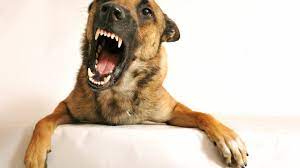When your canine companion suddenly leaves their food to investigate a noise outside, hears a strange sound, or sees a suspicious shadow in the backyard, it can make you wonder what’s going into his head. “Why does my dog growl at nothing?” is a common question that dog owners ask because they believe it is strange behavior.
It’s important to remember that growling is normal dog behavior. Dogs growl out of fear, insecurity, and distrust. So, growling might not necessarily mean aggression. It is okay to let your canine growl unless it is accompanied by biting.
Even though your pup may growl for no apparent reason at times, many of these scenarios are pretty simple to interpret (and often hilarious). So, what’s really happening when your pooch with the seemingly overactive imagination starts moving its mouth? Read this article to understand the common reasons behind this ‘growling out of nowhere’ behavior.
There’s actually a whole list of reasons why your dog might growl at nothing. The first reason is it could be due to something called a fly snapping. They get that name because flies sit on top of dogs’ noses and can startle them if they take off flying.
Another reason your dog could be growling is that they are dreaming. A dog who growls in its sleep might be having a bad dream about the mailman or maybe squirrels.
In addition, dogs have sharpened their hearing and smell to detect things we cannot. They may hear noises we cannot hear that make them uncomfortable.

What does growl mean?
Growling is a form of vocalization in dogs and many other animals. Growls can alert group members of potential danger, show aggression, and indicates their willingness to defend resources such as food, toys, or mates.
The word “growl” has two meanings: it means to make a deep guttural sound in the throat, as to show anger or intention to attack. It also means showing defiance, anger, or protest. Dogs growl to communicate with humans and other animals.
Dogs may also growl to communicate when playing with another animal. The meaning of a growl may vary among breeds of dogs, so it is important to know the breed, learn the warning signs for aggressive behavior, and understand how to read your dog’s body language and growls.
In addition, a Dog growl is defined as a long and low guttural sound that dogs make when they are angry or defensive. An example of a dog growling is the sound made by a dog who is angry that someone has come close to his bone.
Why is my dog barking at nothing?
Barking is one of many forms of vocal communication for dogs. People are often pleased that their dog barks because it alerts them to the approach of people to their home or it tells them there’s something that the dog wants or needs.
There are many reasons your dog might be barking at nothing. It could be because of a medical condition like cognitive dysfunction, noise phobias, hearing loss, or an injury. If you think it’s due to a medical problem, visit a vet for a consultation.
Also, Dogs are naturally very territorial. Whenever something unfamiliar enters their territory, they will bark in order to scare it away. Some dogs also bark at things that they can’t see. This is because if they can hear something, smell it or feel the vibrations of it, they will start to bark as a warning to you and to the imaginary intruder.
Furthermore, you already know that dogs have a keen sense of hearing and smell, but they can also detect changes in the environment. That’s why your dog barks at noises you don’t hear or becomes restless before there’s an earthquake or thunderstorm. Your dog may also become agitated by the activity going on outside of your home.
Why does my dog stare at the wall?
Dogs do all kinds of things that don’t make much sense to us humans, and staring at the wall is one of them. If it’s a behavior that has recently started, they may be sick or hurting. If not, you have to ask yourself what’s going on right before the behavior.
Some dogs stare simply because they’re nervous or excited. It could also simply be an attempt to trigger a reaction from you, especially if you’ve given them attention in response to this behavior in the past.
Also, it could be due to a medical condition or behavior. If you suspect that your dog is suffering from a disease, take him to your veterinarian for a checkup. Once you have ruled out medical causes, you can find ways to prevent wall staring behavior in the future if needed.
In addition, if your dog stares at walls for no discernible reason, it’s likely that he is suffering from canine cognitive dysfunction (CCD). Dogs with this disorder will often find themselves wandering throughout their houses, looking at the walls, and may even seem confused or disoriented.
Why do dogs bark at night?
Dogs bark for many reasons. Some bark because they enjoy the noise; others bark to alert their masters of impending danger. Most often, dogs bark at night because they are lonely or bored. Try leaving a radio on at night to play music, which can help your dog feel like he is not alone.
If possible, spend more time with your dog during the day, so he is not bored. If lack of attention and boredom is not the cause of your dog’s barking, take him to see a vet for a check-up.
Dogs bark at night because they sense something that is unusual, and most likely, it is different from their normal activity that occurs during the day. So they bark at night to warn of danger, to greet people or animals, or to express themselves, which often signals a need for attention.
Why does my dog growl at me for no reason?
Growling doesn’t always mean that your dog is angry or will bite you. Unless there is a reason, such as sleeping, dogs don’t growl for no reason. You need to look for signs and signals to find out why your dog is growling at you.
For example, if you are trying to take a toy away, then your dog might be growling because he does not want you to take his toy or if your dog hates baths, then your dog may be growling because he knows bath-time is coming up and he doesn’t like it.
Also, it’s possible your dog may have learned to growl at you to get something from you. Try ignoring your dog’s growling, and when she stops, give her a treat.
In addition, apart from the threat of being bitten, a growl usually means that your dog needs some space. Sometimes dogs growl when they want something, such as food, a toy, or to go outside. Other times, dogs growl to warn you to stay away from things that belong to them, like their food bowl a bone.
Why do dogs growl when they play?
Dogs growl in play for a variety of reasons. Since dogs don’t have hands, growling can be a way to control certain kinds of interactions. Because dogs don’t have hands, they have to communicate through action or vocalization to show each other what is ok and not ok in terms of play.
Also, dogs growl when they play because they are excited and happy to be playing. Dogs enjoy the rush and power of playful growling, which is a safe way to release pent-up energy.
Dogs growl while they play with each other because they’re letting each other know that it’s just a game. They get so excited that they immediately start to growl and jump on their owners because they’re happy to see them!
In addition, Dogs growl, nip, and bite each other’s necks during play because it’s a natural predatory behavior for dogs. Dogs also growl and bark when they’re excited about something, such as a walk or a car ride. Dogs growling at other dogs are usually more playful than aggressive; however, if one dog presents himself as the alpha, the other dogs may defer to him.
Why does my dog growl at me at night?
This is a protective behavior. Dogs are pack animals, and as members of our families, they look to us for security and protection. Sleeping on a bed with you provides a sense of comfort for them, and the growls may be an attempt to protect their space and possessions from someone (you) invading the area.
If this is the case, the dog is not being aggressive or trying to be dominant; he just feels safer if you stay at a distance.
Another most likely reason your dog is growling at you is that it wants attention, and your response to its growling is reinforcing the behavior. It may also be feeling threatened by you, or it might be suffering from some pain or discomfort that’s causing it to act grumpy.
Also, pay attention as to whether or not the dog makes other noises, as growling at night can sometimes also be associated with seizures. Try getting up and taking your dog out for a walk, and if they continue to show signs that they are uneasy, consult your veterinarian promptly.

Why is my dog barking at nothing outside?
Barking at seemingly nothing out the window is an age-old pastime of dogs everywhere. The reasons they bark can range from alerting their human family to practicing their awesome vocal skills, boredom, or simple playfulness, but it’s often enough just to know they’re doing what they do best: being a loyal and loving companion.
Also, it is typically because they feel something is wrong. If your dog is barking at nothing outside, he may have heard or smelled something you didn’t. If the barking persists, consider contacting an animal behavior specialist to help discover the root cause of your dog’s concerns.
Is dog growling a good thing?
A growling dog is a good thing. It is alerting you to the fact that something is wrong. Growling at an unfamiliar dog is actually a healthy behavior for a dog. Unfortunately, our society tends to penalize dogs for this important warning signal, which can have the effect of suppressing normal, healthy communication behaviors needed to avoid conflict.
Also, growling is a dog communication that has been misinterpreted on many occasions as an unfriendly act. Growling doesn’t necessarily mean your dog is angry or trying to be aggressive. Some animals growl as a sign of fear or anxiety, some do it when they’re frustrated, others when they’re in pain, and some use it as a simple greeting.
Dog growling can be problematic in some situations, but it’s also normal and natural behavior that has communication value for dogs. But at the same time, it is a very important behavior because it is usually a dog’s last-ditch attempt to warn you to stay away and that he has had enough before he feels forced to bite.
Can I stop my dog from growling, and how?
Absolutely, But you need to know why your dog is growling first. If he’s growling at people or other dogs, it can be a sign that he’s afraid and doesn’t want them around. It depends on what makes the dog growl, the reaction of the person or other animal, and the personality of the dog.
If your dog growls at strangers, don’t take it personally. Dogs are pack animals, and it is normal for them to guard and protect you from perceived threats. Consider training your dog to react in certain ways when people come to the house, like sitting or lying down. Or, if you have a gate in the front yard, ask your visitors to wait outside until the dog stops barking.
Also, to stop your dog from growling, do not give them what they want when they growl, understand that growling is normal dog behavior, never punish your dog for growling, and use positive reinforcement as a way to train your dog that you want them to stop.
In addition, exposing your puppy to different people, animals and situations early on will make him more adaptable. This command is extremely useful for situations such as when someone is coming to the door, guests are over, or when you meet new people and/or dogs. Teach your dog to lie down rather than jumping up. After he lies down, give him a treat.
How old can a dog start to growl?
Most puppies start to growl between 2 ½ and three months of age. This can occur when they are playing with you or another animal if they feel threatened or when someone touches their toys or food.
Usually, dogs don’t growl until the age of 8-16 weeks or 4-7 months, but I have heard of some who started a little sooner than that. But at 16 weeks is when it starts to get serious about their growling and even earlier for some.
Most puppies stop growling around seven months old with a few exceptions that can go up to maybe nine months to a year, like Mastiffs, Rottweilers, and other big dogs.
Furthermore, Dogs start to growl, usually at around eight weeks old. It’s a sign they are trying to communicate in a way that they aren’t happy with what is going on. We should never try to discourage this behavior as it could lead them to bite without warning.

Can puppies growl?
Puppies can growl, but instead of a low, intimidating growl like an adult dog, it’s high-pitched and silly. That’s because puppies use their mouths to play, and their growls are just a playful play-noise they make while tussling with their siblings or you.
However, they will usually only growl when they are around five weeks of age. During this period of their life, they have very few teeth but will use them freely in order to defend themselves.
Some puppies begin to growl as early as three weeks old. As dogs get older, they learn to vocalize differently according to the situation. For example, most puppies will quiet down a little when you put it close to their face.
Furthermore, puppies usually learn to growl when they play with other dogs. Most puppy owners wouldn’t consider growling a behavior problem unless the puppy growls when you reach for him/her. In that case, it would be a good idea to talk with your vet or an animal behaviorist.
Why do dog growl when you go near their food?
Dogs can be protective when they eat, and sometimes they may growl or act aggressively if you approach them while they are eating. A dog will growl when near their food because they are saying that you are invading their territory and telling you to back off.
They will also display their aggressive behavior by putting their ears back, showing teeth, and opening their jaw wide to warn you that the next step is a bite.
Also, dogs growl when they want you to know that something belongs to them or is reserved for them. This is especially true in the case of food. Dogs that do not eat well around other dogs may need their own food space, which means safe crating and away from your other pet.
If your dog acts aggressively towards you when he or she has food or treats, this is important to stop because it can lead to other behavioral problems down the road. The good thing? With a bit of training, your dog can learn to feel comfortable with you being around his food, and the behavior will go away.
Why does my dog growl when eating?
This can be a sign of food aggression. Food aggression is related to the dog’s fight-or-flight instinct. Dogs are pack animals, and in the wild, the stronger dogs would eat first while the weaker ones had to wait.
If a dog feels insecure about its food, it may growl to protect it. They instinctively want to protect their valuable possession, which includes resources like food and water.
Also, Dogs are very territorial, especially when it comes to their food. Some dogs growl if they feel a person or another animal is too close to them when they are eating. This is usually normal behavior, and the dog is just trying to protect their food.
German shepherd growling
German shepherds growl like most other breeds of dogs, with the sound coming from their throat but the vibration coming from their chest. The sound will be a low-pitched rumble and may sound like the dog is in pain. German shepherds do not usually growl as much as some other breeds and are generally quiet dogs.
Also, German shepherds have a great amount of volume and tend to say “roo, roo.” Their growls are known for sounding more like barks.

Why is my dog randomly barking?
Dogs sometimes bark in response to external triggers, so it’s important that you quietly observe your dog determine what might be the cause of the barking before you attempt to correct the behavior. It can be frustrating when your dog is randomly barking, but there are a few reasons your dog may be doing so.
Some dogs will bark when they sense someone near their home, strangers passing by on a walk, or a sudden loud noise, like an alarm going off. These types of barks are often considered warning barks and not necessarily random or incessant barks. These barks may occur when there’s something specific to alert you about.
Lack of exercise. If your dog is not getting enough physical activity, he may become bored or frustrated and bark as a way to release some of that energy.
Attention-seeking behavior or Separation anxiety. Your dog may be barking due to stress or loneliness. If your dog barks when you leave the house, then it may be suffering from separation anxiety.
It could be boredom, loneliness, or frustration. Avoid leaving your dog alone for a long period of time. Exercise your dog regularly and make sure they have plenty of toys to play with.
Most dogs are easily trained out of any excessive barking, so long as you can figure out the root cause of the barking behavior and change it.
For example, if your dog barks at those walking by your property, you would take steps to remove it from seeing or hearing anyone outside its territory. Whatever their anxiety, you should comfort them and add training to their daily routine.
Why is my puppy biting and growling?
Biting and growling are typical puppy behaviors. Puppies explore their world and learn about things through play and investigating with their mouths. So it may be that your puppy is simply trying to learn more about you which can result in an unpleasant (but harmless) nip. Puppies bite and growl for a lot of reasons.
One of the main reasons puppies bite is because they hurt or are tired. Also, puppies can be particularly irritable if they are teething, so make sure they have lots of chewy toys to bite on instead of you!
Another reason why puppies bite and growl is because they want your attention. Maybe you’ve gotten busy with work or school, and you’re no longer paying much attention to your dog. Maybe your dog wants you to play tug-of-war and doesn’t know how else to ask. Or maybe he just wants some extra pets and scratches.
In addition, a puppy will growl and bite when they are confronted with something new, particularly if it has some degree of discomfort. The sound may also be a sign that your dog is not comfortable in the situation (such as when meeting another dog) and wants to warn the other animal to stay away.
Why does my dog grumble?
Dogs grumble for a variety of reasons, including excitement, insecurity, and warning of an impending bite. Grumbling can be difficult to decipher. But here are some reasons why your dog grumbles:
The most common cause of grumbling is that the dog has a bone or a favorite toy and doesn’t want to share it with you, another pet in the household, or even other dogs. However, if your dog only grumbles when they get excited (maybe during petting or when you play ball with them), then it is not aggression.
This type of grumbling is actually reassuring in a way as it’s an endearing trait of joy, although pets and children should be taught never to put fingers near an animal’s mouth because puppies will grow up and be less tolerant than dogs.
Also, not all grumbles are growls. Some are little huffing and puffing noises that have nothing to do with aggression. They’re often a sign of stress, especially if your dog appears anxious or fearful. Grumbling can also be a form of attention-seeking, or it may accompany barking or whining.
Why does my puppy growl when I pick her up?
There are a few reasons why puppies growl when they are picked up. It could be that they are startled by the action and may not have seen it coming. Puppies who are sick or injured will growl if they feel discomfort when handled, especially if touched in certain areas. It is also important that you pick your puppy up correctly.
Also, if your puppy growls, squirms, goes limp, or tries to bite when you pick her up, she is likely trying to tell you that she doesn’t enjoy it.
It may look cute when they’re a tiny 80-gram fluff-ball, but it won’t be so cute or funny when they’re 15 kilos. Instead of picking them up, try gently leading them wherever you want them to go with a tasty treat in one hand and an enticing toy in the other.
Why does my dog growl at certain strangers?
Dogs often growl at strangers as a means of expressing displeasure, uncertainty, or fear. A dog that extends its lips and bares its teeth while making a deep, guttural noise is likely growling. Growling is the most obvious sign that your dog may feel threatened by a stranger.
Even if your dog has displayed no signs of aggression in the past, it’s normal for them to become nervous around new people, especially in unfamiliar settings or surroundings.
Again, your dog may be trying to warn the stranger and you that what he thinks of his presence is not very positive. If he actually bites or snaps at the stranger, then he is trying to attack him. This is dangerous and should be stopped immediately.
Conclusion
You’ve likely experienced this weird phenomenon when you notice that your dog is suddenly growling, even though there’s nothing to growl at, which is the reason why the question “why does my dog growl at nothing?” is one of the frequently asked questions.
The first thing to do when your dog growls at nothing is to identify what their trigger might be.


